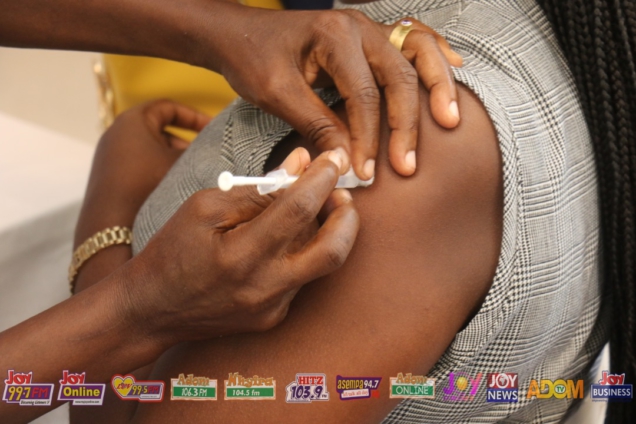More than 100,000 people have received their second dose of the AstraZeneca Covid-19 vaccine as of Sunday, May 23, data from the Ghana Health Service (GHS) has shown.
The exercise, which began on May 19, is expected to inoculate about 360,000 persons who received their first jab from March 1 to 9, this year.
Director of Public Health at the GHS, Dr Franklin Asiedu-Boeko, said those who received their first jab from March 10, would have their second dose in the next phase.
He told the Ghana News Agency (GNA) in an interview in Accra that 380,000 doses of vaccine had been specifically allocated to those in the first phase and said the exercise would not end on May 26 as stated earlier.
Dr Asiedu-Boeko described the exercise as impressive despite the failure of an online application introduced to make the exercise more effective.
“We are happy about the process so far because, despite complaints about the side effects of the vaccine, people are still interested in getting inoculated," he said.
Dr Asiedu-Boeko assured the public that government was still making efforts to acquire more vaccines to get more people vaccinated.
He assured the public that the plan to vaccinate 20 million Ghanaians before the end of the year was on course.
Dr Asiedu-Boeko reiterated the need for the public to keep adhering to the COVID-19 safety protocols by wearing facemasks, using alcohol-based hand sanitizers, coughing or sneezing into tissues, and washing of hands with soap under running water.
Ghana, on Tuesday, March 2, kicked off its mass Covid-19 vaccination exercise in 42 selected districts in the Greater Accra, Kumasi, and Western regions.
As of Friday, April 30, a total of 849,527 AstraZeneca vaccines had been administered to the public.
Ghana recorded its first case of Covid-19 on March 12, 2020. So far 92,513 cases have been confirmed with 783 deaths. There are 1583 confirmed cases.
The novel coronavirus was first recorded in the Wuhan city of China in December 2019.
Coronaviruses are a large group of viruses that are common among animals. In rare cases, they are what scientists call zoonotic, meaning they can be transmitted from animals to humans, according to the US Centers for Disease Control and Prevention.
It has an incubation period of four to six days and fatal, especially for those with a weakened immune system – the elderly and the very young. It could also result in pneumonia and bronchitis.
Latest Stories
-
Ghana shouldn’t have experienced any ‘dumsor’ after 2017 – IES Boss
45 mins -
Lamens flouted some food safety laws in re-bagging rice – Former FDA Boss Alhaji Hudu Mogtari
1 hour -
Afcon exit: Our issue is administrative failure and mismanagement, not lack of talent – Saddick Adams
2 hours -
WAPCo to commence major pipeline maintenance and inspection from November 25
2 hours -
CEO of Oro Oil Ghana Limited Maxwell Commey listed among the 100 Most Influential People Awards, 2024
2 hours -
Power crisis: Amandi is off due to maintenance, not debt – ECG Boss
2 hours -
Votes cast for late Akua Donkor to be declared invalid – Electoral Commission
2 hours -
You can’t keep “incompetent” Otto Addo for the long term – Countryman Songo
3 hours -
Joy FM holds 2024 Prayer Summit for Peace
3 hours -
Lady sues Police and AG over assault in custody
4 hours -
Ghana’s railway sector has been revived under my leadership – Akufo-Addo
4 hours -
Next government must enforce C190 – Women Economic Dialogue Forum
4 hours -
NCCE engages party youth activists at Nandom on peaceful election
4 hours -
SSNIT engages stakeholders on its operations
4 hours -
Defilement: 19-year-old farmer jailed ten years, with hard labour
4 hours

